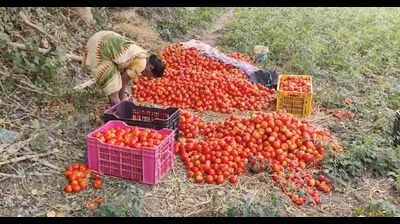Odisha’s tomato crisis: Farmers in distress as prices crash to ₹2 per kg | Bhubaneswar News

Bhubaneswar: Tomato farmers across Odisha, particularly in districts like Dhenkanal, Keonjhar, Rayagada, Koraput and Kandhamal, are facing severe losses due to a drastic fall in prices, with their produce selling for as little as Rs 2 per kg. The steep decline has forced many farmers into distress sales, highlighting the lack of cold storage facilities as a major challenge. This is in stark contrast to last July’s situation when customers in Odisha bought tomatoes at Rs 100 per kg.
Farmers, who hoped for good returns after investing in fertilisers, pesticides and labour, now find themselves struggling to recover their costs. “We expected at least Rs 10- Rs 15 per kg, but with prices crashing, we are barely making any money. If we had proper cold storage, we could wait for better prices instead of selling at a loss,” said a distressed farmer from Dhenkanal.
Similar concerns were echoed in Keonjhar where many farmers are either dumping their produce on the roads or selling at throwaway prices to avoid complete wastage. The situation has worsened due to oversupply and inadequate market linkages, leaving farmers vulnerable to middlemen who offer them minimal rates.
Experts believe the crisis could have been mitigated with better storage infrastructure and govt intervention. “Odisha produces a huge amount of vegetables, but due to a lack of cold storage facilities and processing units, farmers are facing such losses. If tomatoes could be stored longer, farmers wouldn’t be forced to sell immediately at low prices,” said Ashok Mishra, an agricultural economist.
In Unit-1 Market in Bhubaneswar, tomatoes were selling at Rs 12-15 per kg, causing huge losses to farmers. “This is a phenomenon every year during the end of the winter season. Tomato, being a highly perishable item, cannot be stored for many days, while throughout the year we depend on other states for tomatoes and buy them at a higher rate,” said Kabiraj Swain, a vegetable vendor.
Farmers are now urging the state govt to step in with immediate relief measures, such as procurement at a fair price and subsidies for storage facilities. Without urgent action, they fear similar crises in the future, threatening their livelihoods.
Despite repeated attempts, a reaction from the state agriculture department could not be obtained.
















